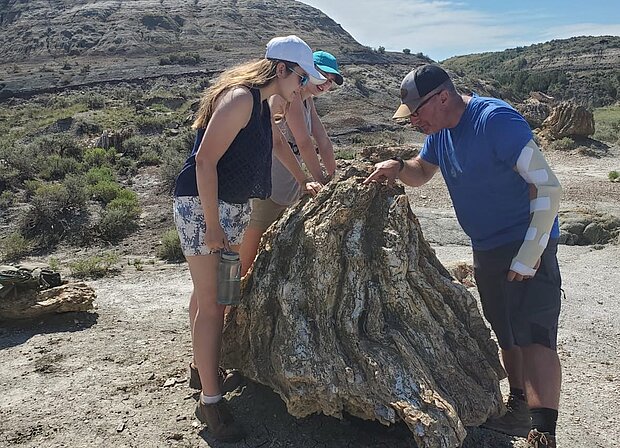
Ben Laabs is a talented instructor who brings a passion for teaching and learning to his many courses, which include the introductory-level Earth History, Environmental Geology, Climate Change and Energy, and Geology of the Red River Valley. He also teaches Structural Geology and Glacial Geology upper-level courses.
Ben Laabs is more than willing to get a little dusty or muddy when it comes to giving his students a close-up, first-hand look at the world around us.
“I try to make discovery available as much as possible,” said Laabs, who joined the NDSU faculty in 2016. “The process of discovery is hugely impactful in student learning – it can be a great motivator. It also gives students the confidence to continue the learning process on their own, and they get excited to share what they learn with others.”
Laabs is a talented instructor who brings a passion for teaching and learning to his many courses, which include the introductory-level Earth History, Environmental Geology, Climate Change and Energy, and Geology of the Red River Valley. He also teaches Structural Geology and Glacial Geology upper-level courses.
As Laabs knows, hands-on experience often works best in the business of teaching and learning. So, his students closely study the Earth during field trips to the Theodore Roosevelt National Park or along the banks of the Red River; they conduct lab work with rocks and fossils; and they learn to use technology to produce and analyze aerial imagery.
“I get to take advantage of the natural space in the Red River Valley,” he said, giving an example of his approach. “The easy-to-see landscapes and the fascinating natural history of our region is a great way to capture student interest and curiosity. Students develop a broad perspective on how the Red River Valley evolved through time and how its natural history affects the valley today.”
Laabs helps his students develop a learning-focused mindset. To do this, he sets goals that are not measured with a grade but rather by learning outcomes. According to Laabs, students can then concentrate on smaller, more achievable knowledge advances.
“As students focus on their learning process and less on making a certain grade, they often end up meeting or exceeding their own expectations and become better independent learners,” Laabs said, noting he hopes they also develop an enthusiasm for lifelong learning.
Laabs continually looks for ways to improve his teaching methods, and he found that teaching remotely during the COVID pandemic helped him do just that.
“Finding new ways to engage with students in remote learning environments made me think of different ways to communicate and stimulate students’ interest in the material,” Laabs said. “The experience made me think more deeply about many of the subjects I teach, made me a better communicator and reminded me of the importance of trust in the teaching process.”
Laabs earned his bachelor’s degree from the University of Wisconsin-Madison, master’s degree in geology at Northern Arizona University and his doctorate in geology from the University of Wisconsin-Madison.